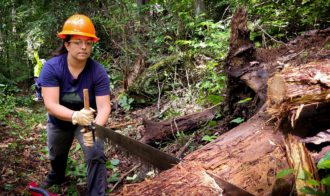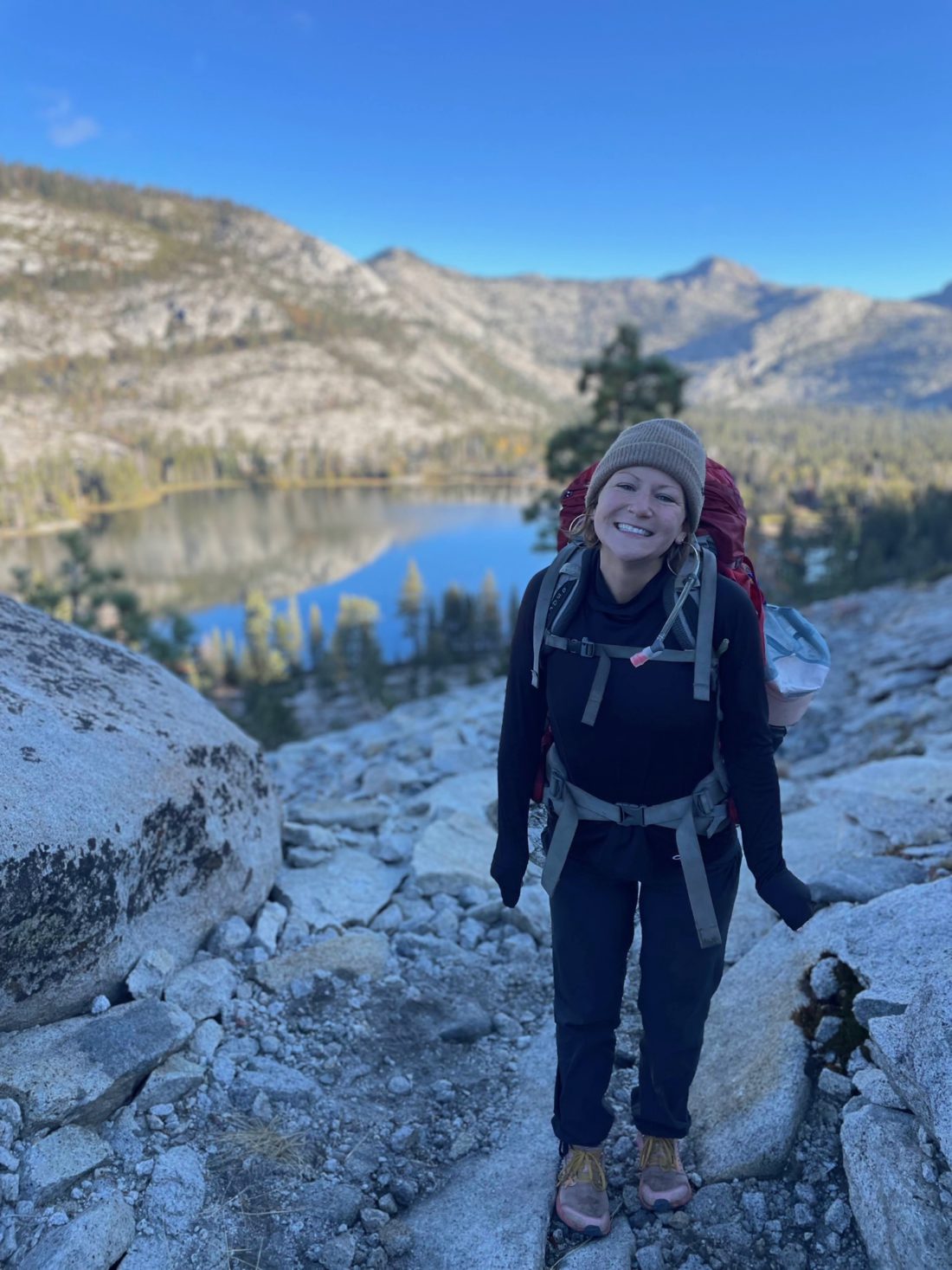Growing up with an Eagle Scout for a father made Annie Egelkraut more knowledgeable about the outdoors than most children. The family spent summers in a pop-up camper in Swannanoa and Montreat, where she and her brothers learned plant and animal safety, as well as how to tie knots, build fires and dig a 6-inch cathole.
As an adult, Egelkraut has continued to expand her skills, thanks to Landmark Learning in Cullowhee. The school focuses on training people who work in the outdoors as rescuers or instructors. The program is just one of many offering wilderness skills in Western North Carolina. Others include Wild Abundance, Holistic Survival School, Nantahala Outdoor Center and Southern Appalachian Wilderness Stewards, or SAWS.
And like Egelkraut, countless individuals are taking advantage of these opportunities to learn how to safely camp outdoors, enjoy the region’s water resources or forage for their own food.
While it’s difficult to pinpoint the exact number of wilderness skills schools, businesses and nonprofits that operate in the region, the sector is robust. In February, Mountain BizWorks’ MADE X MTNS partnership, which seeks to expand WNC’s outdoor industry, released a study that noted outdoor activities such as backpacking, day hiking and vehicle camping generated an economic output of $4.9 billion per year for the region and resulted in 48,000 full-time jobs.
Generally, wilderness skills classes fall into two categories: professional training for those who work in the outdoors industry and classes targeted more toward personal empowerment or betterment — with plenty of overlap between the two. Still, no matter a person’s age, gender or expertise, instructors in the field say there are opportunities in the region for anyone to pick up new skills and discover ways to sustain themselves in the wild.
Wild-ing out
Wilderness first responder training — particularly if certified by the National Outdoor Leadership Schools, or NOLS, a nonprofit dedicated to training outdoors leaders — can support careers for people like Egelkraut. Various classes fall under the umbrella of wilderness medicine, which can be geared toward everyone from outdoor activities instructors to emergency medical technicians.
According to Kaitlin de Varona, executive director of SAWS, many people who are drawn to the nonprofit’s training opportunities arrive with previous experience; not everyone is comfortable in the backcountry, so participants are self-selecting to an extent. Some are drawn to SAWS because they want to change careers to work in conservation, while others want to volunteer their time doing conservation work as they pick up new skills.
Founded in 2010 and headquartered in Asheville, SAWS hires people to work on trail crews twice a year — fall and spring — in federally designated wilderness areas such as Shining Rock Wilderness and Joyce Kilmer Memorial Forest. Here, members learn land and trail management, master various tools and techniques such as using “loppers” (large pruning scissors that can cut away brush) and gain certification in wilderness first aid.

“We use the traditional tools — crosscut saws,” de Varona explains. “We don’t use chain saws, because they’re prohibited in wilderness.”
De Varona notes that the U.S. Forest Service has less of a field presence in the Southeast than it used to and so it “[relies] on us to be the eyes and ears for them.”
While the nonprofit’s wilderness rangers do not have the authority to write tickets, they are trained to educate guests on the Forest Service’s “Leave no trace” principles and wilderness safety guidelines. These rangers also attend Forest Service meetings and share observations.
As SAWS’ wilderness rangers work closely with the Forest Service, de Varona adds, it presents unique networking opportunities.
De Varona is particularly proud of the Wilderness Skills Institute, a free two-week training held annually in May at the Cradle of Forestry near Brevard. The program is a collaborative effort involving SAWS, the Appalachian Trail Conservancy and the Forest Service. Classes in previous years have ranged from trail design, rock splitting and shaping to crosscut saw certification and crosscut saw sharpening, horse packing, advanced stonework and even water behavior 101.
Unlike some professions, obtaining an academic degree for a career in the outdoors is not a prerequisite for success, continues de Varano. It’s more important to be able to solve problems, handle isolation and exhibit grit. “I can have eight degrees, but if I cannot camp in the woods, it’s not going to be a good fit,” she says.
Ancestral skills
Other wilderness skills classes fulfill a more personal or spiritual need. Through hands-on lessons, individuals can learn about wild edibles, making stone tools, herbal medicine, bow building, hide tanning, basket weaving or even carpentry. Personal enrichment, gaining competence in survivalism, a desire to “re-wild” — that is, reconnect with nature — or achieving homesteading goals all draw people to these types of courses.
Wild Abundance began in 2010 as a school for primitive skills, permaculture and gardening, says founder and director Natalie Bogwalker. Early on, students took classes on home butchering, meat preservation and foraging.
While, the school continues to offer workshops on foraging and growing one’s own food (the online gardening school is taught by Xpress gardening columnist Chloe Lieberman), Bogwalker says its most popular classes currently focus on sustainable building.
A course on constructing tiny houses, which is offered multiple times per year, appeals to people who want “to have a smaller ecological footprint,” she explains. The class mainly attracts “total beginners,” but Bogwalker notes even professional contractors have enrolled.
The other popular course focuses on carpentry and is open to anyone who identifies as a woman. In fact, there is a subgenre of wilderness skills classes, including a women’s rewilding retreat, intended for this specific audience. At the retreat, which Bogwalker began teaching 10 years ago, students gather in an open classroom in Barnardsville to learn about wild foods, plant medicine and “earth-centered self-care” with a focus on the cycles of nature and the phases of a woman’s life.
“It’s really about using skills that our ancestors did,” she says.
Bogwalker notes that she rotates the offerings each year so women can return to the retreat for something new. “I really enjoy connecting in an all-women’s group and talking about our bodies, the different phases of our lives, talking with other women about the experience of being a woman and a woman as a creature of the earth,” she says. “There’s something special that happens when you get in a group of all women — it’s pretty transformative.”
Nantahala Outdoor Center also offers women-only classes, such as a three-day retreat in Bryson City that is primarily survival-based. The course teaches women how to build shelter, collect water and make it drinkable, create knots and knives, and offers wilderness first-aid certification.
Going beyond comfort zones
Egelkraut’s love and respect for the outdoors remains as strong today as it did when she was a child digging catholes in Swannanoa. She earned a degree in recreation management at Appalachian State University in Boone and does contract work as a wilderness first responder.
When she spoke with Xpress, she was at Elk Neck State Forest in Maryland; the week prior, she was leading a group of teenagers on an excursion in Joshua Tree in Southern California.
Egelkraut understands that being in the wilderness might not appeal to everyone. But she hopes people will become comfortable developing new skills and use them to give outdoor activities a chance.
“When we can push beyond comfort zones, there’s so much growth that can occur,” she says. “That’s really my favorite part about being immersed in nature — you have to overcome and in the overcoming … you’re experiencing so much beauty no matter how challenging the situation is.”




Before you comment
The comments section is here to provide a platform for civil dialogue on the issues we face together as a local community. Xpress is committed to offering this platform for all voices, but when the tone of the discussion gets nasty or strays off topic, we believe many people choose not to participate. Xpress editors are determined to moderate comments to ensure a constructive interchange is maintained. All comments judged not to be in keeping with the spirit of civil discourse will be removed and repeat violators will be banned. See here for our terms of service. Thank you for being part of this effort to promote respectful discussion.